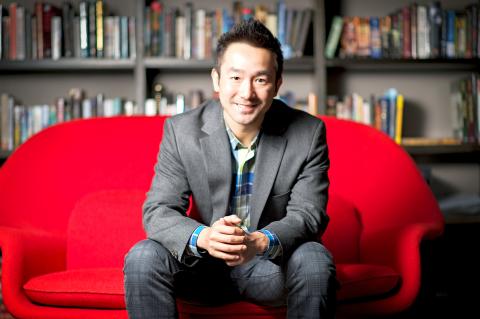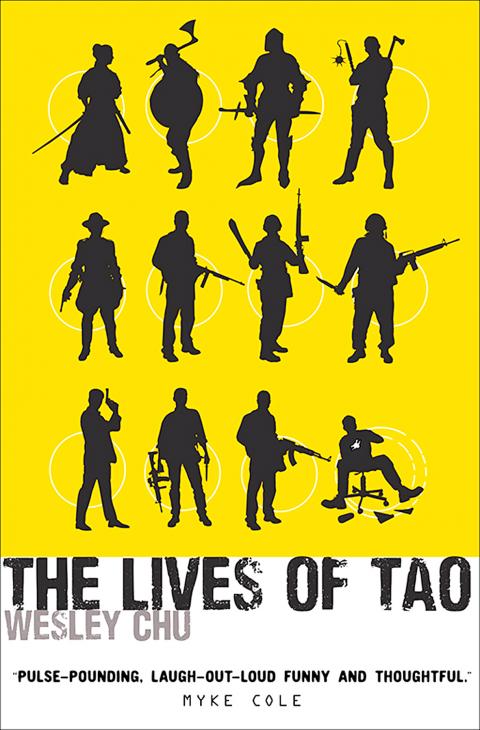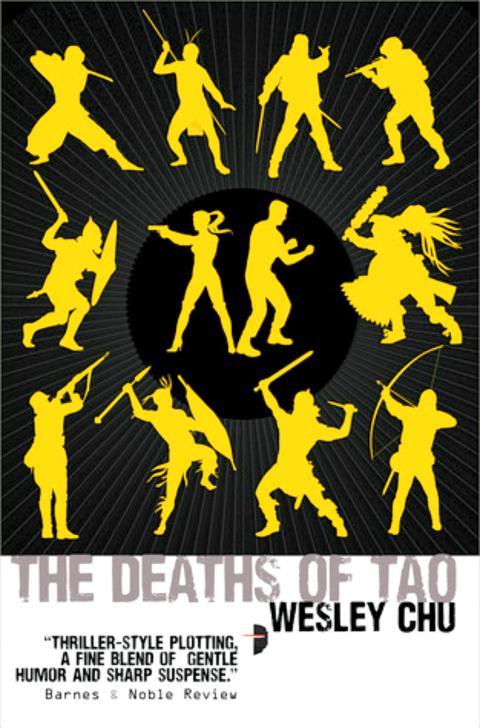It’s 11pm in Taipei but 10am in Chicago, where the award-winning author Wesley Chu (朱恆昱) is as usual in his “cave,” looking a little frayed around the edges. It’s not just the bathrobe, which has been ripped at the elbow by his dog. Handsome enough to have modeled and been cast in minor Hollywood movie roles, Chu has bed hair, a full beard and that dazed look of someone who has just woken up — or worked all night.
Framed by groaning bookshelves and sitting in his comfy chair, it would appear that the life of a science fiction writer is about letting go, being free to imagine time-bending scenarios and characters that crisscross the universe in search of derring-do. But it’s not quite that simple.
We have been emailing back and forth for weeks and after text messaging on Google Hangouts we agree to a “face-to-face” interview. If it was the 20th century, this would not be happening. In fact, it would be thought of as science fiction.

Photo courtesy of Wesley Chu
Born in mid-1970s Taipei, Chu was initially brought up in Chiayi by his grandparents because his father was studying in the US. He recalls the convenience store his grandfather owned, a chicken coop, an out-house and “biting the nose of the principal’s son because he took my toy.” At the tender age of five he joined his parents in Nebraska, but still considers himself Taiwanese, and Taiwanese-American.
Fast forward to the tail end of the 1990s and Chu had graduated from the University of Illinois with a degree in management information systems. He would go on to work as a consultant and software engineer before joining Bank of America and becoming an associate vice president.
Comfortable. Yes. Successful. Yes. But it wasn’t the life Chu wanted. In fact, he hated it. His original plan was to be a writer but his father dissuaded him, worried he would “suffer” financially as an artist. The filial son suspects that even now his father would prefer that he was working at JPMorgan rather than on fiction. Odd for an English professor to think this, you might say, but entirely in character for a “Tiger Dad.”

Photo courtesy of Wesley Chu
To get the ball rolling during our face-to-face, I point out the obvious and ask: “It really is true then that authors roll around in a bathrobe all day and essentially think great thoughts?”
“Yes, it’s fantastic. Going to work is a walk of 40 steps,” Chu says.
“Well, those 40 steps can be a challenge, I’m sure, but don’t you miss the cut and thrust of cubicle politics, the rustle of spreadsheets and the endless meetings?” I ask.

Photo courtesy of Wesley Chu
“Not one red second. It’s a different politics now, there’s publishing politics. If anything, it’s sometimes worse,” Chu says.
“You’re dealing with people who are very close to their work. In business and corporations, at least in business it’s just business. In publishing, especially for the writers, their books are like children,” he adds.
Chu is technically a SFF (science fiction and fantasy) author, and a “high concept” or “big idea” writer, meaning he comes up with plausible alternate realities, particularly those in which some kind of compelling innovation has taken place. His characters are strong and full of personality. They clash, strive and evolve according to how events play out in the novel.
His prose has a cinematic style, meaning while reading you can imagine how it would play in the movie theater. He is quite insistent that his writing style is natural rather than the result of having one eye on a big payday, saying, “It’s just the way my voice comes out.”
He’s also rather modest about his English skills, claiming his wife will divorce him if she has to do another editing job for him. Another plus is he has a globalized outlook, incorporating Asian concepts and geographical locations in his novels. His second book, The Deaths of Tao takes place in Taipei and Kaohsiung.
His literary coming out party was The Lives of Tao, which I read as having a Buddhist worldview, but Chu puts me straight on that one: “I didn’t have Asian spiritualism in mind when I was world-building the novel. I was actually more focused on writing a very personal story that reflected what I was going through at the time. The Lives of Tao, in essence, is a coming-of-age story.”
The protagonist works a dead-end job, has low self esteem and in the end finds purpose in life. While that may sound familiar, the alien that inhabits the protagonist and helps him become the person he wants to be, is of course, pure fiction. The Lives of Tao won an Alex Award and spawned a trilogy, which isn’t a bad start to a literary career.
“I’ve won a few awards,” he says. “Nothing really changes. You get a bump in sales for sure but other than that, you keep on writing. Even making the New York Times bestseller list doesn’t change your life.”
For me, his second book, Time Salvager, the first installment of another planned trilogy, is more cogent, muscular and confident. It’s set 400 years in the future and the hero is a jaundiced, addicted individual whose job is to go back in time, steal energy and not get caught. It’s strong enough to have been optioned by Paramount, with Michael Bay slated to direct.
Chu’s books have been translated into Russian, German, Hebrew and Hungarian, while Time Salvager will be published by Nautilus in Taiwan and People’s Literature in China. He says he would “love to work with Asian filmmakers on a film/television adaptation.”
Some people don’t think about the future and are not interested in books on this subject. But a grounded reality and history is also important to Chu, and it’s what makes his stories appealing.
“If you think about it, 400 years ago, we weren’t even in the steam age yet. It was horses, swords and wooden ships,” he says.
“If you bring someone from the 17th century to the present, they would probably swear we’re wielding magic. Technology advances at a curve. We’ve had more advancements in the past 50 years than in the past 500.”
As I might have intimated, Chu is really understated — from his bed hair down to the four bathrobes he wears out in a year. He claims to do nothing but write in his “cave” and occasionally get walked by his dog. He doesn’t mention his acting, modeling, nerd credentials, business and banking experience, the fact he’s a gymnast and martial artist, though he does note that “just this year, I went to Tanzania in Africa to summit Kilimanjaro.”
If the boy in Chiayi could see his future life with all the compelling innovations that have taken place, I guess it would look a bit like the science fiction/urban fantasy Chu writes.
1 OH 1, can refer to Taipei 101; an introductory course or analysis; One uh One, a spare male at a party, or a useless person — always male; there are about 1.01 men for every 1 woman, thus, every one hundred and first male is not going to find a partner-; a one-on-one interview

In Taiwan there are two economies: the shiny high tech export economy epitomized by Taiwan Semiconductor Manufacturing Co (TSMC, 台積電) and its outsized effect on global supply chains, and the domestic economy, driven by construction and powered by flows of gravel, sand and government contracts. The latter supports the former: we can have an economy without TSMC, but we can’t have one without construction. The labor shortage has heavily impacted public construction in Taiwan. For example, the first phase of the MRT Wanda Line in Taipei, originally slated for next year, has been pushed back to 2027. The government

July 22 to July 28 The Love River’s (愛河) four-decade run as the host of Kaohsiung’s annual dragon boat races came to an abrupt end in 1971 — the once pristine waterway had become too polluted. The 1970 event was infamous for the putrid stench permeating the air, exacerbated by contestants splashing water and sludge onto the shore and even the onlookers. The relocation of the festivities officially marked the “death” of the river, whose condition had rapidly deteriorated during the previous decade. The myriad factories upstream were only partly to blame; as Kaohsiung’s population boomed in the 1960s, all household

Allegations of corruption against three heavyweight politicians from the three major parties are big in the news now. On Wednesday, prosecutors indicted Hsinchu County Commissioner Yang Wen-ke (楊文科) of the Chinese Nationalist Party (KMT), a judgment is expected this week in the case involving Hsinchu Mayor Ann Kao (高虹安) of the Taiwan People’s Party (TPP) and former deputy premier and Taoyuan Mayor Cheng Wen-tsan (鄭文燦) of the Democratic Progressive Party (DPP) is being held incommunicado in prison. Unlike the other two cases, Cheng’s case has generated considerable speculation, rumors, suspicions and conspiracy theories from both the pan-blue and pan-green camps.

Stepping inside Waley Art (水谷藝術) in Taipei’s historic Wanhua District (萬華區) one leaves the motorcycle growl and air-conditioner purr of the street and enters a very different sonic realm. Speakers hiss, machines whir and objects chime from all five floors of the shophouse-turned- contemporary art gallery (including the basement). “It’s a bit of a metaphor, the stacking of gallery floors is like the layering of sounds,” observes Australian conceptual artist Samuel Beilby, whose audio installation HZ & Machinic Paragenesis occupies the ground floor of the gallery space. He’s not wrong. Put ‘em in a Box (我們把它都裝在一個盒子裡), which runs until Aug. 18, invites